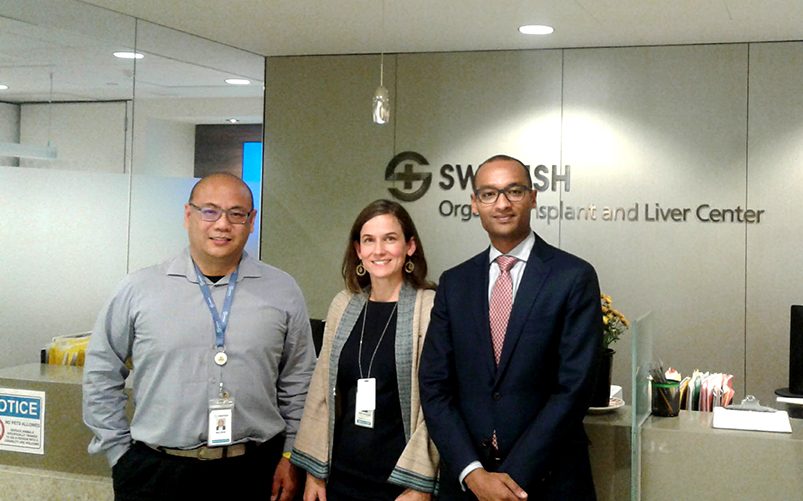By Ruth Bayang
NORTHWEST ASIAN WEEKLY

From left: Nelson Tang, Lindsey LaRock, and Dr. Nizar Mukhtar.
You or someone you know could have hepatitis B and not know it.
“In the Asian population, the prevalence of hepatitis B (a liver infection caused by the hepatitis B virus — HBV) can be as high as 10 percent,” said Dr. Nizar Mukhtar at Swedish Hospital. Mukhtar is board certified in internal medicine, gastroenterology, and transplant hepatology.
According to the U.S. Department of Health and Human Services, Asian Americans make up only 5 percent of the U.S. population, and they account for more than half of the burden of chronic HBV infection. Known as a “silent killer,” liver cancer patients typically show no symptoms until the latter stages of the disease.
That’s why Swedish is rolling out a pilot program to increase awareness and get people screened — particular those in the Asian and sub-Saharan African immigrant populations.
“We are using the mammography coaches (vehicles) — hoping to do some liver cancer screening and hepatitis B management outreach starting in December,” said Swedish Advanced Registered Nurse Practitioner (ARNP) Lindsey LaRock. It would be the first ever mobile liver health clinic in Seattle, possible nationwide.
“Patients tell me — it took a lot of emotional energy to be here (at a clinic),” said LaRock. “The questions are often, ‘What did I do wrong?’ or ‘I thought it was because my family was dirty.’” She hopes the community outreach of a mobile van will normalize perceptions about HBV, hepatitis C, and liver cancer.
“In the U.S. and western countries, [HBV is transmitted through] exposure to infected blood, experimenting with intravenous drugs, or sexual interaction,” said Mukhtar. “That’s where some stigma comes into play.” He said in Asia and Africa, the primary mode of transmission is mother to child. “It’s not the fault of anybody… you were just born.”
Mukhtar said you could have the disease for decades and never exhibit any symptoms. The only way to find out if you have it is to get tested or screened. Primary care doctors don’t test for it, as it’s not part of the annual well visit.
“Immigrants from places like China, Korea, Japan, India, sub-Saharan Africa … these are populations that should automatically be tested, even if they don’t have any symptoms,” said Mukhtar. He also said first degree relatives, such as children born to immigrants from those regions, should be tested. It’s not clear why Asia and some parts of Africa are highly endemic.
Swedish wants to partner with community clinics and organizations that are already doing outreach. They are especially interested in working in the Chinatown-International District. With the large number of immigrants coming in for tech jobs at Amazon or Microsoft, Mukhtar said it makes sense to target these populations.
To help with outreach to the Asian population, Swedish has a Cultural Responsive Care program to support patients who can’t speak English. Outreach Education and Patient Engagement Program Managers like Nelson Tang will help find medical practitioners who speak a patient’s native language and help them receive quality health care services, among other things.
Mukhtar emphasized the significant morbidity and mortality associated with liver diseases in general. “If they’re coming to us because of symptoms, it means they are already in the very late stages.” Symptoms can include fluid retention and gastrointestinal bleeding.
“Every month, I’m seeing patients who are finding out about their disease because of being diagnosed with liver cancer through imaging done for another reason like abdominal pain, or because they started to develop pain related to the liver cancer,” said Mukhtar. Often he sees Asian men in their 50s to 60s. “Very functional men who have families, young children, and coming in with very severe liver cancer that could have been treated or prevented.”
There is a vaccine available that protects individuals from acquiring a hepatitis B infection. Doctors suggest you get the shot if you are going to be in contact with someone who is infected, such as a first degree family member, or if you’re traveling to areas where there are high rates of infection.
Mukhtar is on the tumor board, where he and other doctors meet weekly to discuss treatment plans for liver cancer patients. “[Liver cancer] is very treatable when detected early. It is the key to giving patients the best chance at a cure.”
Ruth can be reached at editor@nwasianweekly.com.



